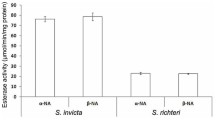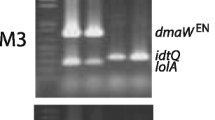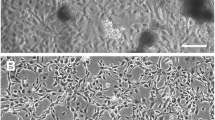Abstract
This study describes the biochemical characterization and genetic variation of cytosolic esterases in the alfalfa leafcutting bee,Megachile rotundata (Fab.). Esterase isozymes were separated by nondenaturing polyacrylamide gel electrophoresis and isoelectric focusing and characterized by inhibition with eserine sulfate, EDTA, paraoxon, andp-hydroxymercuribenzoate. Based on inhibition patterns and substrate specificity, there are major differences between adults and immature forms and more subtle differences between male and female adults. M. rotundata esterases are largely organophosphate sensitive and the two major adult allozymes were highly variable within the population examined. Differences in esterase expression between life stages with respect to niche and the occurrence of diploid males are discussed.
Similar content being viewed by others
References
Albans, K. R., Alpin, R. T., Brehcist, J., Moore, J. F., and O'Toole, C. (1980). Dufour's gland and its role in secretion of nest cell lining in bees of the genusColletes.J. Chem. Ecol. 6549.
Alcock, J., Barrows, E. M., Gordh, G., Hubbard, L. J., Kirkendall, L., Pyle, D. W., Ponder, T. L., and Zalom, F. G. (1978). The ecology and evolution of male reproductive behaviour in the bees and wasps.Zool. J. Linn. Soc. 64293.
Aldridge, W. N. (1953). Serum esterases 1. Two types of esterase (A and B) hydrolyzing p-nitrophenyl acetate, propionate and butyrate, and a method for their determination.Biochem. J. 67481.
Bergmann, F., Segal, R., and Rimon, S. (1957). A new type of esterase in hog-kidney extract.Biochem. J. 67481.
Bitondi, M. M. G., and Mestriner, M. A. (1983). Esterase isozymes ofApis mellifera: Substrate and inhibition characteristics, developmental ontogeny, and electrophoretic variability.Biochem. Genet. 21985.
Bryan, J. K. (1977). Molecular weights of protein multimers from polyacrylamide gel electrophoresis.Anal. Biochem. 78513.
Bull, J. J. (1983).Evolution of Sex Determining Mechanisms Benjamin/Cummings, Menlo Park, Calif.
Davis, B. J. (1964). Disc electrophoresis. II. Methods and application to human serum proteins.Ann. N.Y. Acad. Sci. 121404.
Frohlich, D. R. (1989).Characterization of Esterases and Glutathione S-Transferases in a Solitary Bee, Ph.D. dissertation, Utah State University, Logan.
Gerber, H. S., and Klostermeyer, E. C. (1972). Factors affecting the sex ratio and nesting behavior of the alfalfa leafcutting bee. Wash. State U. Agr. Exp. Sta. Bull. 73.
Guirguis, G. N., and Brindley, W. A. (1974). Insecticide susceptibility and response to selected pollens of larval alfalfa leafcutting beesMegachile pacifica (Panzer) (Hymenoptera: Megachilidae).Environ. Entomol. 3691.
Guirguis, G. N., and Brindley, W. A. (1975). Carbaryl penetration into and metabolism by alfalfa leafcutting bees,Megachile pacifica.J. Agr. Food Chem. 23274.
Guirguis, G. N., and Brindley, W. A. (1976). Effect of chlorcyclizine, aminopyrine, or phenobarbital on carbaryl metabolism in alfalfa leafcutting bees.Environ. Entomol. 5590.
Hames, B. D., and Rickwood, D. (1981).Gel Electrophoresis of Proteins. A Practical Approach IRL Press, Washington, D.C.
Hefetz, A., Fales, H. M., and Batra, S. W. T. (1979). Natural polyesters: Dufour's gland macrocyclic lactones form brood cell laminesters inColletes bees.Science 204415.
Hopkinson, D. A., Mestriner, M. A., Cortner, J., and Harris, H. (1973). Esterase D: A new human polymorphism.Ann. Hum. Genet. Lond. 37119.
Karnovsky, M. J., and Roots, L. (1964). A “direct coloring” thiocholine method for cholinesterases.J. Histochem. Cytochem. 12219.
Klostermeyer, L. E., and Soo Hoo, C. F. (1968). Chromosome number in the leafcutter bee,Megachile rotundata.Ann. Entomol. Soc. Am. 61782.
Krieg, P., and Marek, M. (1983). Protein and esterase changes in the haemolymph of the queens of honey bee,Apis mellifera L.Comp. Biochem. Physiol. 75B513.
Laemmli, U. (1970). Cleavage of structural proteins during the assembly of the head of bacteriophage T4.Nature 227680.
Lee, R. M., and Brindley, W. A. (1974). Synergist ratios, EPN detoxication, lipid, and drug induced changes in carbaryl toxicity inMegachile pacifica.Environ. Entomol. 3899.
Lester, J. L., and Selander, R. K. (1979). Population genetics of haplodiploid insects.Genetics 921329.
Neville, D. M. (1971). Molecular weight determination of protein-dodecyl sulfate complexes by gel electrophoresis in discontinuous buffer system.J. Biol. Chem. 2466328.
Nunamaker, R. A., and Wilson, W. T. (1982). Isozyme changes in the honey bee,Apis mellifera L. during larval morphogenesis.Insect Biochem. 1299.
Page, R. E., and Metcalf, R. A. (1982). Multiple mating sperm utilization, and social evolution.Am. Nat. 119263.
Pamilo, P., Varvio-Aho, S., and Pekkarinen, A. (1978). Low enzyme gene variability in Hymenoptera as a consequence of haplodiploidy.Heredity 8893.
Reisfeld, R. A., Lewis, V. J., and Williams, D. E. (1962). Disc electrophoresis of basic proteins and peptides on polyacrylamide gels.Nature 195281.
Rosenthal, G. A., and Janzen, D. H. (1979).Herbivores: Their Interaction with Secondary Plant Metabolites Academic Press, London.
Seger, J. (1983). Partial bivoltinism may cause alternating sex-ratio biases that favour eusociality.Nature 30159.
Snyder, T. P. (1975). Lack of allozymic variability in three bee species.Evolution 28687.
Stephen, W. P., and Torchio, P. F. (1961). Biological notes on the leafcutter bee,Megachile (Eutricharea)rotundata (Fabricius).Pan-Pac. Entomol. 3785.
Stock, M. W., and Robertson, J. L. (1982). Esterase polymorphism and response to insecticides during larval development of the western spruce budworm.J. Econ. Entomol. 75183.
Tepedino, V. J., and Parker, F. D. (1988). Alternation of sex ratio in a partially bivoltine bee,Megachile rotundata (Hymenoptera: Megachilidae).Ann. Entomol. Soc. Am. 81467.
Tripathi, R. K., and Dixon, S. E. (1968). Hemolymph esterases in the female larval honey bee,Apis mellifera L., during caste development.Can. J. Zool. 461013.
van Asperen, K. (1962). A study of housefly esterases by means of a sensitive colorimetric method.J. Insect Physiol. 8401.
Walker, C. H., and Mackness, M. I. (1983). Esterases: Problems of identification and classification.Biochem. Pharmacol. 323265.
Wrigley, C. W. (1971).Gel Electrophoresis. Methods of Enzymology, Vol. 22 Academic Press, New York, pp. 559–564.
Author information
Authors and Affiliations
Rights and permissions
About this article
Cite this article
Frohlich, D.R., Brindley, W.A., Burris, T.E. et al. Esterase isozymes in a solitary bee,Megachile rotundata (fab.): Characterization, developmental multiplicity, and adult variability. Biochem Genet 28, 347–358 (1990). https://doi.org/10.1007/BF00554065
Received:
Revised:
Issue Date:
DOI: https://doi.org/10.1007/BF00554065




